-
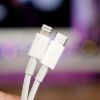 +10 +1
+10 +1Apple reduces USB-C to Lightning Cable price amid rumors 2018 iPhones dropping USB-A
Apple’s 1m USB-C to Lightning Cable, which allows faster charging for compatible iPhones and iPads, has been reduced in price. When the cable debuted, the original price was $25 for the 1m version, and $35 for the 2m version. It appears that last month, Apple quietly dropped the price of the 1m USB-C to Lighting Cable by $6, going from $25 to $19. This change comes amid rumors that new iPhones will drop the USB-A-equipped Lightning to USB Cables in favor of USB-C cables that are able to facilitate faster charging.
-
 +19 +3
+19 +3IBM warns of instant breaking of encryption by quantum computers: 'Move your data today'
Welcome to the future transparency of today as quantum computers reveal all currently encrypted secrets -- a viable scenario within just a few years.
-
 +13 +3
+13 +3Ubuntu MATE 18.04 LTS - See What's New
A very pleasing traditional desktop that you might want to try.
-
 +17 +3
+17 +3Light could make semiconductor computers a million times faster or even go quantum
A technique to manipulate electrons with light could bring quantum computing up to room temperature. A team of researchers in Germany and at the University of Michigan have demonstrated how infrared laser pulses can shift electrons between two different states, the classic 1 and 0, in a thin sheet of semiconductor.
-
 +11 +2
+11 +2The West Chicago Tower Mystery
Shortwave Trading, Part I. By Alexandre Laumonier.
-
 +9 +2
+9 +2Ubuntu 18.04 LTS Released, This is What's New
Ubuntu 18.04 LTS is now available to download. Read our comprehensive rundown of everything new in Ubuntu 18.04 LTS to see why we think this is the BEST release yet!
-
 +9 +1
+9 +1Microsoft’s $25 million ‘A.I. for Accessibility’ seeks to amplify humanity
Microsoft kicked off its annual developer conference, Build 2018, on May 7 with the announcement of a new program designed to invest in accessibility technologies built using artificial intelligence and machine learning -- with a $25 million endowment and a five-year mission.
-
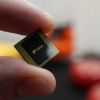 +5 +1
+5 +1Watch out, Qualcomm: China set to launch $47 billion chip investment fund
China is reportedly set to announce a new 300 billion yuan ($47.4 billion) investment fund for its semiconductor industry. The fund will be used to develop the sector as Beijing tries to narrow the gap between U.S. chipset manufacturers and its own players, the Wall Street Journal (paywall) reported, citing sources familiar with the plans.
-
 +14 +3
+14 +3'Next generation' flaws found on computer processors
Researchers have found eight new flaws in computer central processing units that resemble the Meltdown and Spectre bugs revealed in January, a German computing magazine reported on Thursday.
-
 +10 +2
+10 +2This ‘Demonically Clever’ Backdoor Hides In a Tiny Slice of a Computer Chip
Researchers have built a proof-of-concept processor that uses secretly stored electrical charge to trigger an ultra-stealthy backdoor. By Andy Greenberg.
-
 +11 +4
+11 +4How to make sure the C-suite knows your IT department is cool
So much of what an IT department does is invisible, especially when everything is working as it should. But CIOs and other IT leaders need to make sure that the C-suite values and rewards IT, whether the tech accomplishments are behind the scenes or in the cloud.
-
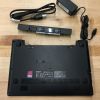 +20 +5
+20 +5It’s Impossible to Prove Your Laptop Hasn’t Been Hacked. I Spent Two Years Finding Out.
I spent two years trying to get someone to tamper with my laptop, so I could then detect it. Somewhere along the way, I realized this might never happen.
-
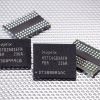 +9 +2
+9 +2Samsung, Micron, Hynix allegedly conspired to keep DRAM prices high, class action suit filed
According to law firm Hagens Berman, competition between between Samsung, Micron and Hynix were forcing prices to drop on RAM, despite record demand for the memory. Starting the first calendar quarter of 2016 and through the third quarter of 2017, Hagens Berman alleges that the trio's revenues from global DRAM sales more than doubled as a result of the production decrease and price-fixing scheme.
-
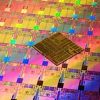 +17 +1
+17 +1Intel Corp. May Be Entering the Smartphone, Tablet and Wearable Chip Markets
Chip giant Intel (NASDAQ:INTC) currently dominates the market for processors that go into notebook and desktop computers, but its last attempt to become a key vendor of applications processors for smartphones and tablets failed miserably. Intel also tried to enter the wearable computing market by buying smartwatch maker Basis, but that didn't seem to end well, either, as the company laid off most of the members of its wearable computing group.
-
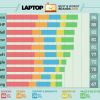 +4 +1
+4 +1Best & Worst Laptop Brands 2018
Which brand of laptop is best? Laptop Mag ranks the biggest laptop brands on performance, design, support and value. See the scorecard.
-
 +15 +5
+15 +5Widescreen laptops are dumb
A laptop is more than just a video playback machine. I’ve been thinking about aspect ratios. After years of phones, laptops, tablets, and TV screens converging on 16:9 as the “right” display shape — allowing video playback without distracting black bars — smartphones have disturbed the universality recently by moving to even more elongated formats like 18:9, 19:9, or even 19.5:9 in the iPhone X’s case. That’s prompted me to consider where else the default widescreen proportions might be a poor fit, and I’ve realized that laptops are the worst offenders.
-
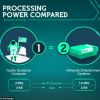 +21 +3
+21 +3Infographic reveals how the Apple Watch is equivalent to two iPhone 4s
In 1965 Gordon Moore, co-founder of Intel, predicted that the number of transistors in a circuit would double every two years. This is the premise of Moore's law, and it's why we carry around pocket-sized smartphones that are more powerful than 1980s supercomputers. But with technology moving so quickly, it can be easy to lose sight of just how far computers have come in a few decades.
-
 +26 +2
+26 +2Move Over Moore’s Law, Make Way for Huang’s Law
Graphics processors are on a supercharged development path that eclipses Moore’s Law, says Nvidia’s Jensen Huang
-
 +42 +8
+42 +8Apple Plans to Use Its Own Chips in Macs From 2020, Replacing Intel
Apple Inc. is planning to use its own chips in Mac computers beginning as early as 2020, replacing processors from Intel Corp., according to people familiar with the plans.
-
 +27 +6
+27 +6IBM sees quantum computing going mainstream within five years
Quantum computing going mainstream. It may sound impossible, but IBM thinks it might be the future in the next five years. That is one of the five technological innovations that IBM predicts will change lives everywhere. The computers sold today, also known as classical computers, are limited in their capabilities to solve certain issues, generally when it comes to large-scale computations.
Submit a link
Start a discussion




















